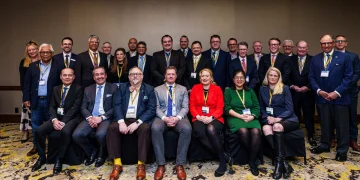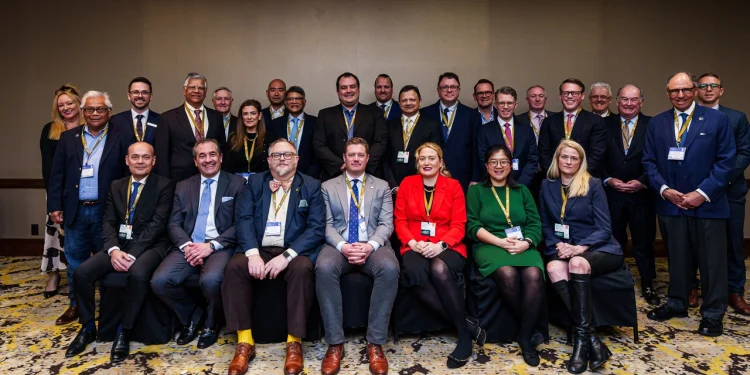By Maria Kalamatas | April 3, 2025 | The Logistic News
A select group of senior executives from top maritime companies, including V.Group, d’Amico, OL Shipping Group, Ardmore Shipping, International Seaways Inc, and AET Tankers, convened yesterday at the Hilton Stamford Hotel & Executive Meeting Centre in Connecticut to launch the 40th edition of CMA Shipping. But this was no ordinary panel discussion—it began behind closed doors.
The Seatrade Maritime Club Round Table, a hallmark precursor to every Seatrade Maritime event worldwide, returned for its third edition at CMA Shipping. With the strict adherence to Chatham House Rules, the session created a confidential setting for C-suite executives to debate the forces currently reshaping global shipping. As described by John Lindquist, President of the Connecticut Maritime Association and Director of Marine Development at Stabilis Solutions, “this forum has consistently sparked intelligent, solution-oriented discussions that stay with decision-makers well beyond the event.”
Geopolitics and the Future of Trade
Moderated by Chris Aversano, Partnership Lead for Maritime Operations at Wood Mackenzie and Seatrade Maritime Club Ambassador, the first session confronted the intensifying complexity of global trade routes. “Disruption is no longer hypothetical—it’s the norm,” said Aversano. The panel dissected how emerging geopolitical alliances and the ripple effect of protectionist trade policies are dramatically reshaping maritime economics.
With new corridors opening and old ones becoming volatile, the discussion reinforced the need for agility, foresight, and recalibrated partnerships across the industry.
AI: Disruption or Transformation?
Captain Alexandra Hagerty, a dual founder of Captains Without Borders and Hagerty Maritime Consulting, led the second major conversation—this time on Artificial Intelligence. Under the banner, “The Role of AI in Transforming Shipping,” the group explored the promise and pitfalls of automation, data-driven navigation, and machine learning across logistics and vessel operations.
More than just a buzzword, AI was dissected as both a catalyst for efficiency and a potential disruptor for traditional shipboard roles—echoing broader labor concerns within maritime organizations.
Seafarers and the Green Transition
The final segment focused on those most directly affected by all this transformation: the seafarers.
Led by Darren Shelton, Director of Moran Shipping and Seatrade Maritime Club Ambassador, the discussion examined how global decarbonization strategies must be implemented with, not just for, the workforce. “Alternative fuels and emission regulations are meaningless if crews are not adequately trained, supported, and integrated into this transition,” said Shelton. The session called for urgent reforms in training, safety, and career development as part of a more sustainable and equitable shipping future.
A Broader Stage for 2025
Beyond the Round Table, CMA Shipping 2025 introduces a brand-new Expo Stage conference stream, open to all attendees and focused on technical innovation in AI, decarbonization, and cybersecurity. Running alongside the main conference from April 1–3, this addition reflects the industry’s growing appetite for practical insight into fast-moving threats and opportunities.
Since its founding in 1985, CMA Shipping has built its reputation on providing North America’s maritime professionals with access to leading minds and mission-critical trends. The event, organized by Seatrade Maritime – Informa Markets, continues that legacy in its 40th edition with a dual-track approach to accessible content and strategic foresight.
For more information or to register, visit the official CMA Shipping website.























